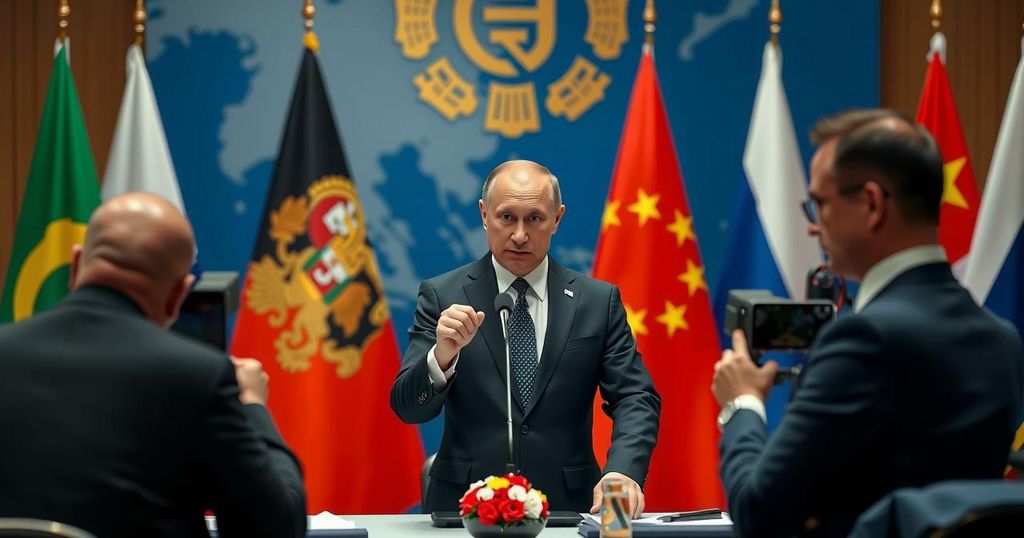Vladimir Putin Hosts Brics Summit to Showcase Resilience Against Western Pressures
Vladimir Putin is hosting the Brics summit in Kazan, aiming to demonstrate that Western sanctions have not isolated Russia. The summit includes leaders from emerging economies such as China, India, and Iran, and seeks to forge partnerships and alternatives to the U.S. dollar for global trade. However, notable divisions exist within the Brics nations, complicating prospects for significant collaboration. The summit is indicative of Russia’s efforts to maintain a strong geopolitical presence despite international pressures.
In the city of Kazan, President Vladimir Putin is convening the Brics summit, an event that underscores a significant geopolitical maneuver amidst the backdrop of Western sanctions intended to isolate Russia due to its actions in Ukraine. Inviting over 20 heads of state, including prominent leaders such as Xi Jinping of China, Indian Prime Minister Narendra Modi, and Iranian President Masoud Pezeshkian, the Kremlin describes this summit as one of its most significant foreign policy gatherings to date. The event is intended to convey a singular, resolute message: the efforts to isolate Russia from the international community have unequivocally failed. Chris Weafer, a founding partner at Macro-Advisory, noted, “The clear message is that attempts to isolate Russia have failed. It’s a big part of the messaging from the Kremlin that Russia is withstanding sanctions.” With Brics—comprising Brazil, Russia, India, China, and South Africa—as a collective meant to counterbalance Western influence, additional nations, including Egypt, Ethiopia, Iran, and the UAE, are also being welcomed into this fold. Notably, Saudi Arabia has been invited to join as well. This coalition of Brics nations, which represents 45% of the global population, boasts a collective economic output exceeding $28.5 trillion, accounting for roughly 28% of the world economy. Russian officials assert that around 30 other countries are seeking to either join Brics or deepen relationships with the group. This summit is expected to emphasize Brics as the embodiment of the ‘global majority.’ However, as President Putin seeks to present this international camaraderie, critics draw attention to the divergent interests and lack of cohesive objectives among Brics nations. Noteworthy economist Jim O’Neill remarked, “In some ways it’s a good job for the West that China and India can never agree about anything.” The existing rifts within the group, such as tensions between Egypt and Ethiopia, and the historical rivalry between Iran and Saudi Arabia, further complicate expectations for unified progress. Putin’s agenda will likely focus on advancing conversations regarding the establishment of alternatives to the U.S. dollar for international transactions, recognizing that many of Russia’s economic hurdles stem from dollar-denominated trade. Weafer stated, “Russia’s main interest is in breaking the dominance of the US dollar. It wants Brics countries to create an alternative trade mechanism and cross-border settlement system that does not involve the dollar, the euro or any of the G7 currencies.” Ultimately, while Putin endeavors to project a narrative of unity, it remains to be seen whether the differing priorities and perspectives among Brics countries will hinder substantive collaboration. In Kazan, the President’s challenge will be to navigate around these disparities to showcase that Russia is not isolated from the global stage but rather is a central player within this emerging bloc.
The Brics summit takes place during a critical juncture in international relations, where the West has imposed numerous sanctions on Russia for its military actions in Ukraine. The invitation of major global leaders to this summit illustrates Russia’s strategic efforts to reaffirm its influence and alliances amidst isolation attempts by Western nations. Brics was established as a collective voice for emerging economies and aims to provide a counterweight to Western dominance in global economic policies. With significant political and economic discourse expected at the summit, the implications of this meeting extend beyond mere symbolism, potentially reshaping international alliances and economic practices. The grouping initially included Brazil, Russia, India, and China, with South Africa joining later. With aspirations to expand, Brics serves as a platform for countries seeking alternative frameworks in global governance and trade, particularly in the face of U.S. dollar hegemony.
The Brics summit in Kazan hosted by Vladimir Putin represents a crucial move by Russia to assert its position on the global stage amid ongoing attempts by the West to isolate it. The gathering not only brings together key leaders but also aims to showcase a united front against Western sanctions. However, the divergent interests and rivalries among Brics members, especially between powerhouses like China and India, as well as ongoing tensions involving newer members, may pose significant challenges to the group’s efficacy. As President Putin seeks to fortify alliances and bolster economic resilience, the true outcomes of this summit will depend on the ability of Brics to transcend internal divisions and present a cohesive alternative to Western-led economic systems.
Original Source: www.bbc.com




Post Comment